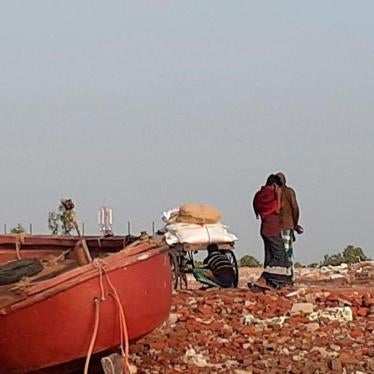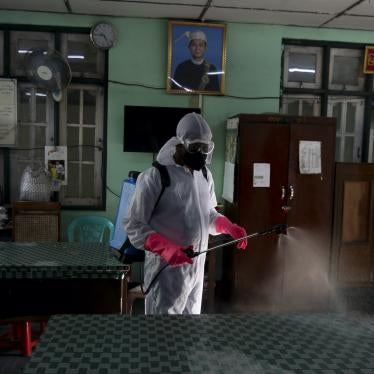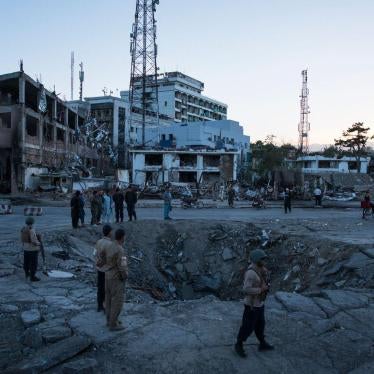Statement of Manny Maung, Myanmar Researcher, Human Rights Watch
Subcommittee on International Human Rights
Standing Committee on Foreign Affairs and International Development
December 10, 2020
Study of the Impacts of Covid-19 on Internally Displaced People in Myanmar
Thank you to the Chairperson and Honorable Members of Parliament for inviting me to appear before this Committee to discuss the impacts of Covid-19 on internally displaced people in Myanmar. My name is Manny Maung and I am the Myanmar Researcher for Human Rights Watch.
Decades of conflict have resulted in over 360,000 internally displaced peoples across the country. They are mainly members of ethnic minority communities spread across northern Myanmar, in Kachin and Shan States; in western Rakhine State; and in the southeast near the Myanmar-Thai border. Renewed conflict has created fresh displacements in 2020 in both Rakhine and Shan States. Humanitarian agencies reported that the government did not take measures to ensure that they could deliver emergency aid under the government-imposed travel restrictions to protect against the spread of Covid-19.
In October, Human Rights Watch released a report, “An Open Prison without End,” on Myanmar’s detention of 130,000 Rohingya Muslims in Rakhine State since 2012.[1] Human Rights Watch found that the squalid and oppressive conditions imposed on the interned Rohingya and Kaman Muslims amount to the crimes against humanity of persecution, apartheid, and severe deprivation of liberty. Starting in August 2017, a military campaign of killings, sexual violence, arson, and forced eviction of Rohingya in northern Rakhine State forced more than 700,000 to flee to Bangladesh. Human Rights Watch determined the Myanmar security forces committed ethnic cleansing, crimes against humanity, and acts of genocide.
As you know, Covid-19 creates more vulnerability in already vulnerable groups. To date, Myanmar has just 29 confirmed Covid-19 cases among IDP populations, recorded from July to the end of November. There are no reported cases among IDPs in Kachin, Shan, or the southeast. However, we do not think this is an accurate reflection of reality. Factors such as a lack of testing resources and services, fears of stigma in crowded camps, and fear of officials is likely contributing to severe underreporting of Covid-19 cases among IDP populations. Government blocks on humanitarian access for international organizations and aid agencies make it difficult to investigate further on the ground. However, the failure to provide an adequate health response is exemplified by Myanmar’s nationwide “Action Plan for the Control of COVID-19 Outbreak at IDP Camps,” which does not include testing or plans for the country’s internally displaced people.
The situation in Myanmar is complex and dire. Aid agencies report extremely difficult circumstances in which their ability to deliver aid is frequently impeded. The Myanmar government requires aid workers to apply for travel authorizations on a monthly basis, and has imposed stronger rules on movement and access to curb possible Covid-19 infections. While the government has the responsibility to take measures to protect public health, they must ensure availability of essential humanitarian services without discrimination. However, we have found that in some cases, aid workers are limited to dropping off supplies at the camp entrance. In other cases, such as in Rakhine State, they are completely denied entry into camps. Camps outside of government-controlled areas in Kachin or Shan States are totally inaccessible because of government blocks on movements to disputed areas.
Discriminatory restrictions on freedom of movement, which disproportionately impact the Rohingya population, have been longstanding in Rakhine State. The Myanmar government has prevented virtually all Rohingya from obtaining citizenship. Lacking legal identity documentation, they are particularly vulnerable to rights violations linked to barriers to freedom of movement. Numerous checkpoints and ID requirements have expanded opportunities for police and military extortion, arbitrary arrests, violence, and further limitations on movement during the Covid-19 crisis.
Since June 2019, a government block on mobile internet services in Rakhine State has curbed access to information amid armed conflict. This has seriously hindered outreach and education around Covid-19 prevention and management, particularly for displaced people. While displaced people recognize the dangers from Covid-19, many told us the daily challenges of survival in conflict areas – avoiding fighting, landmines, and explosive remnants of war – take precedence. Similarly, in Kachin and Shan States, the saturation of landmines has created significant concerns and barriers for safe and voluntary return of displaced families to their home villages.
Myanmar has taken few steps to reform and revise the laws, policies, and practices that have effectively entrenched statelessness of the Rohingya and the forced displacement of other ethnic minority communities. Therefore, we ask this Committee to urge the government of Canada to take several concrete actions:
- Strengthen advocacy in support of ethnic Rohingya to have non-discriminatory access to citizenship, with issuance of appropriate legal documentation. Citizenship is a priority because it is linked to various human rights violations experienced by the community. Specifically, press the Myanmar government to:
- End discriminatory laws, policies, and practices and repeal or amend the 1982 Citizenship Law to fully conform with international standards.
- Immediately allow humanitarian organizations, independent media, and human rights monitors unhindered access to IDPs, including overhauling the government’s “travel authorization” process for aid workers that is used to systematically deny access to certain areas.
- Create the conditions necessary for durable solutions for displaced Rohingya, as well as for Rohingya refugees in Bangladesh.
- Fully implement the recommendations outlined by the 2017 Rakhine Advisory Commission as the best path forward to addressing the root causes to the Rohingya crisis.
- Support international efforts towards justice and accountability for atrocity crimes and assist efforts to investigate and collect information and evidence in line with recommendations made to the International Criminal Court on the situation in Myanmar.
- Press the Myanmar government to lift all arbitrary restrictions on freedom of movement, including discriminatory regulations, curfews, and local orders targeting minority groups, and cease all practices that restrict movement, which directly affects access to emergency medical services, and livelihoods.
- Continue to support the United Nations High Commissioner for Refugees and other UN agencies by ensuring that humanitarian groups have adequate personal protective equipment and that IDPs have adequate access to medical facilities, including quarantine facilities, and support and oversight to ensure health care is compliant with safety and dignity for those exposed to illnesses.
- Press the Myanmar government and all armed groups to immediately end the use of antipersonnel landmines, and urge Myanmar to immediately ratify the Mine Ban Treaty.
[1] Human Rights Watch, “An Open Prison Without End: Myanmar’s Mass Detention of Rohingya in Rakhine State,” https://www.hrw.org/report/2020/10/08/open-prison-without-end/myanmars-mass-detention-rohingya-rakhine-state.








